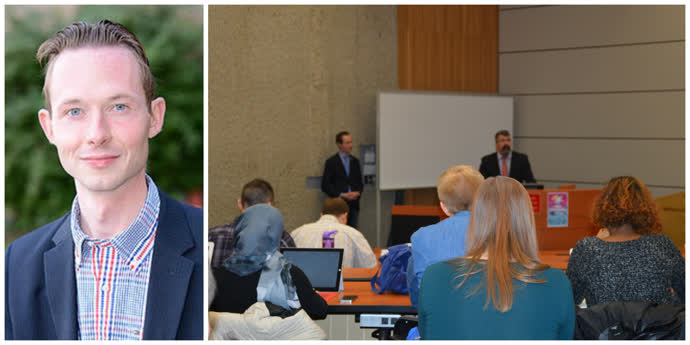
Dean Paton introduces UAlberta Law alumnus and member of Parliament for St. Albert-Edmonton, Michael Cooper, during his visit to the Law Centre on January 23.
In January 2015, RCMP Constable David Wynn was shot and killed outside a casino in St. Albert. The event not only shook the city's residents to the core, but also triggered a parliamentary bill aimed at closing the legal loophole that released Const. Wynn's killer on bail a month before the attack, in spite of his lengthy criminal record.
Bill S-217, better known as "Wynn's Law," was the subject of a lecture at UAlberta Law given by alumnus and current member of Parliament for St. Albert-Edmonton, Michael Cooper. As deputy justice critic appointed by interim opposition leader Rona Ambrose and member of the Parliamentary Justice Committee, Cooper has been among the most vocal proponents of the new law, which, if enacted, would require that an accused's criminal history be presented at bail hearings.
In his lecture, Cooper blamed the loophole that allowed Shawn Rehn to walk free, which led to Const. Wynn's death, on a mismatch between legislative language and current legal practice. In the case of Bill S-217, the new legislation would, among other things, replace the word "can" with the word "shall," as in "the accused's criminal history shall be presented at bail hearings." A small change - but an enormously consequential one.
The original wording, Cooper asserts, is a relic from a time when such information on a criminal suspect would have been much harder to obtain than it is now.
"50 or 60 years ago, if a person was standing trial in Alberta and had a criminal conviction in New Brunswick, getting that information in a timely manner would have been very difficult," he explains.
"But in 2017 there are no longer any obstacles to obtaining such information. The new law is therefore simply a matter of bringing the law up to date in line with present-day technology."
He adds that presenting such information in bail hearings is already standard practice in courtrooms across the country.
"It's already considered a duty for the prosecutor to reveal prior convictions, and the way in which things transpired [in the Rehn hearing] was more a matter of sloppiness than anything else," he states.
"All it would take to eliminate this problem would be to change the word "may" to the word "shall" in the legislation."
A rookie MP, Cooper took over as member of Parliament for St. Albert-Edmonton after unseating incumbent Brent Rathgeber, making him the only CPC candidate to successfully unseat an incumbent in the 2015 federal election. In the years prior to his political debut, Cooper worked as a civil litigator for Brownlee LLP before joining Ogilvie LLP. He was called to the Alberta Bar in 2010.
Cooper states that while running for political office had long been in the back of his mind, the decision to make the move was a precipitous one, and a matter of being in the right place at the right time.
"You never know when you might get the opportunity to run for office," he says.
"There are a lot of factors that play into it, including time, and there's no saying how that's going to play out. In my case, I had the opportunity and the support structure, and I went for it."